
So we have been learning Swahili proverbs KiSwahili. It is a traditional approach to learning the language that has been used ever since East Africans have been teaching KiSwahili formally. The last title, Kuelekeza si kufuma ~ to aim is not to hit, is used to encourage the youth to realize the goals they set for themselves. Dunia duara ~the earth is round~ is used to remind people of the circle of life and that no matter how far you go away from home you will eventually end up in your backyard. I am posting the first paper I had to write for my Political Culture of Kenya class. We were asked to write about a critical incident that challenged us. Here is what I had to say:
Let's Get Personal
I can’t say I was shocked by the conversation I had with our housekeeper Phyllis, but I was stunned at the seriousness of her reaction to my answer of why I actually came to Kenya. Her and I were standing in the kitchen together, she was drying dishes as I made toast with peanut butter and jelly. We were exchanging niceties about our lives and families, laughing and I was telling her about AU Abroad Kenya. She was delighted by the description of our program but it wasn’t enough; she wanted to know why I, Justine Raschio, actually had come to Kenya. I explained that I am exploring international development as a career and that I wanted to experience development outside of a textbook and the classroom. She laughed uproariously in my face. I stood silent for a moment and then asked her to explain her amusement. She said, “I’m laughing because Kenya is not developing. If anything, this country is going backwards. Any visible progress is surface level. I have this job, but I still can’t feed or take care of my two daughters like a mother should.” Immediately I asked her to qualify “backwards” to draw some meaning from her observation and she told me, “Everything is moving backwards; there is no real progress. The progress you see is only on the surface.” She put away the last dish, I finished my toast and we both exited the kitchen to go our separate ways for the evening. As she walked out our front door I wondered where she would go home to, what her daughters would be doing, and what they all would eat for dinner, because I knew as I walked to the bathroom I would be in my upscale apartment, with my roommates eating a three course meal and probably going out at night. Phyllis and I talked for ten minutes, but her reaction has concerned me ever since, especially because we have a new housekeeper now so Phyllis and I may never be able to finish our conversation.
Later that evening, my roommates and I went to Gypsy’s and I overheard a young Kenyan woman consoling one of my roommates after a man had told my roommate she would never make a difference in Kenya. The woman said, “Of all the things that you came here to do, the most important thing is that you came here to change your own life.” Her thoughts in conjunction with my conversation with Phyllis earlier thoroughly confused me and forced me to rethink my purpose here in Kenya I realized that maybe I had overlooked my personal reasons for coming here. The Gypsy woman’s comment forced me to think more critically about Phyllis’ comment about surface level development. Scholars, do-gooders and ethical multinational businesses usually have honest intentions to make positive changes through their development initiatives, but from the two women’s comments I have come to learn that sometimes as much these agents of change may think they have made substantial changes in a foreign country, it may be difficult to quantify how deeply into the cultural fabric they have truly penetrated. The combination of the two comments helped me realize that maybe I will be changed far more than I will make change. The women really challenged me to think that I may be significantly changed and may not have made a positive “developmental” impact on the people and community I work with.
As I reflect on the experience to write this paper, I feel like at the moment Phyllis floored me by laughing at my reason for visiting Kenya I failed to react. I was so stunned, and her laugh was so funny that for a second I just stood there with her. I reacted inwardly to the woman at Gypsy because she wasn’t talking to me. Mostly I am confused and interested by the insight of these women’s personal experiences with the development culture in their home country. I think my reactions were appropriate, or at least I can’t think of any other way I would have responded to these experiences besides further personal introspection. At the least I am very glad Phyllis’s response to my answer was so genuine because it has forced me to reach inside myself to find a truer reason for why I came to Kenya and the woman at Gypsy forced me to question more critically what I see as my own personal development versus community development during my time here.
In all honesty, I don’t know how well I understand either of these experiences. I have taken into consideration that these women come from entirely different socio-economic classes and their comments reflect the experiences they have had with development. Phyllis represents the bottom level of Maslow’s Hierarchy of Needs and the woman at Gypsy represents the top. Phyllis wants to see development change her personal life and the woman at Gypsy is concerned with how other’s interpret the way development affects their own lives. I do think these experiences will lead me to think more critically about the work I do with ISSA. If anything, those experiences have already changed my entire perspective of my purpose for studying abroad in Kenya. I would consider that refinement of purpose to be monumental and I am interested to see how that change will manifest itself in my behavior throughout the rest of the semester.
Later that evening, my roommates and I went to Gypsy’s and I overheard a young Kenyan woman consoling one of my roommates after a man had told my roommate she would never make a difference in Kenya. The woman said, “Of all the things that you came here to do, the most important thing is that you came here to change your own life.” Her thoughts in conjunction with my conversation with Phyllis earlier thoroughly confused me and forced me to rethink my purpose here in Kenya I realized that maybe I had overlooked my personal reasons for coming here. The Gypsy woman’s comment forced me to think more critically about Phyllis’ comment about surface level development. Scholars, do-gooders and ethical multinational businesses usually have honest intentions to make positive changes through their development initiatives, but from the two women’s comments I have come to learn that sometimes as much these agents of change may think they have made substantial changes in a foreign country, it may be difficult to quantify how deeply into the cultural fabric they have truly penetrated. The combination of the two comments helped me realize that maybe I will be changed far more than I will make change. The women really challenged me to think that I may be significantly changed and may not have made a positive “developmental” impact on the people and community I work with.
As I reflect on the experience to write this paper, I feel like at the moment Phyllis floored me by laughing at my reason for visiting Kenya I failed to react. I was so stunned, and her laugh was so funny that for a second I just stood there with her. I reacted inwardly to the woman at Gypsy because she wasn’t talking to me. Mostly I am confused and interested by the insight of these women’s personal experiences with the development culture in their home country. I think my reactions were appropriate, or at least I can’t think of any other way I would have responded to these experiences besides further personal introspection. At the least I am very glad Phyllis’s response to my answer was so genuine because it has forced me to reach inside myself to find a truer reason for why I came to Kenya and the woman at Gypsy forced me to question more critically what I see as my own personal development versus community development during my time here.
In all honesty, I don’t know how well I understand either of these experiences. I have taken into consideration that these women come from entirely different socio-economic classes and their comments reflect the experiences they have had with development. Phyllis represents the bottom level of Maslow’s Hierarchy of Needs and the woman at Gypsy represents the top. Phyllis wants to see development change her personal life and the woman at Gypsy is concerned with how other’s interpret the way development affects their own lives. I do think these experiences will lead me to think more critically about the work I do with ISSA. If anything, those experiences have already changed my entire perspective of my purpose for studying abroad in Kenya. I would consider that refinement of purpose to be monumental and I am interested to see how that change will manifest itself in my behavior throughout the rest of the semester.
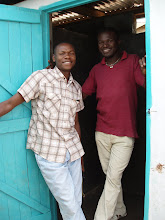
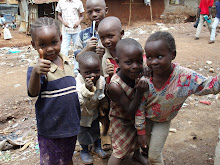
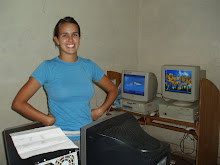
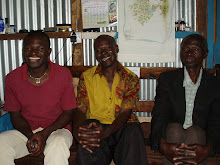

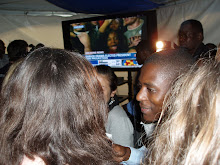
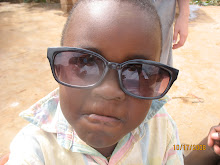

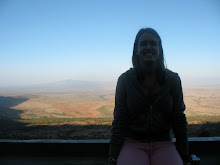
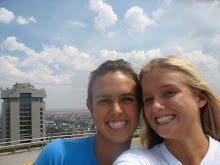
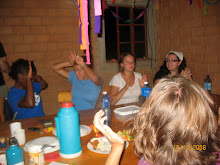
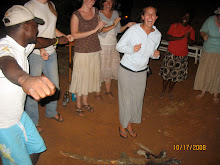
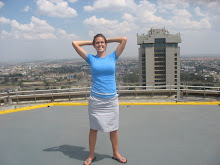
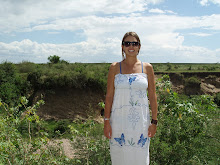

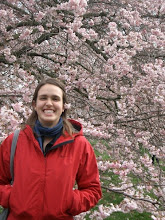
7 comments:
You are an incredible writer! I think eventually you should write your own book. Hope classes are going well, glad the safari was tons of fun! Think about e-mailing me back sometime, okay? :)
- Beno
That was a great essay! Sounds like your interactions with Kenyans will really get you thinking about what you are doing in Kenya and what you'll do when you get back here. Speaking of back here, you are lucky that you get to miss my annual fall tradition of strep throat/bronchitis, etc, which is just setting in! Have fun at your pageant tomorrow!
ps. we just took on a new client at my internship: Wales tourism! I am so excited!
Wow! You are an amazing writer! I read your blog at work late yesterday afternoon and couldn't help but get a bit teary eyed. Hope you don't mind but I had to share your paper with the crew here at work. They are now all hooked on following your Kenya adventure.
Wow J! That was incredible. It is definitely interesting hearing what the true natives think about these programs that are introduced to Kenya. I'd like to hear more about what other men/women think and feel about these programs. Keep it up J. You are inspiring me more and more. - T
HI Justine,
It was very interesting to read your last entry. First, I take it that you still have not made it to Kisayani, right? I am sure that when you do you will get a sense of poverty and reality that is still new. I think that what the Kenyans are saying is absolutely true. #1 the absolutely most important thing that you could do for Kenya as an American is to let yourself be changed. #2, never think that you have the solution to the Kenyans problems. Truly, they know themselves best. Ask more questions than you give answers, ask them what they need and work to support them in getting it. I don't know if you ever read about Martin Luther King's idea of servant leadership, but I believe it is only through leading from behind that those with privilege can be allies to the disadvantaged. Think about it this way, would you go into Harlem and claim to know how to solve their problems? Of course not, but they are African-Americans not Africans. Remember that much of what we do and have in the US does not work so there really is not any reason for others to copy our mistakes, we can just support them by mobilizing the resources our privilege affords us to serve them. Let the Kenyans be your teachers. I guarantee it will be worth every penny of that tuition!
Arika Makena
Thank you for remembering grandpa's 80th BD. We had a blast celebrating with over 90 family and friends. How fortunate to be surrounded with so much love.
JJ your experience in Kenya will be a lifetime learning tool. How fortunuate for you to be able to attend school out of the states. I know from my year and half traveling around the world following graduation from college represented a a learning experience way beyond my formal education. I still remember so many highlights and apreciate that have both the desire and financial means to accomplish this goal. Go girl go. Grandma
Post a Comment